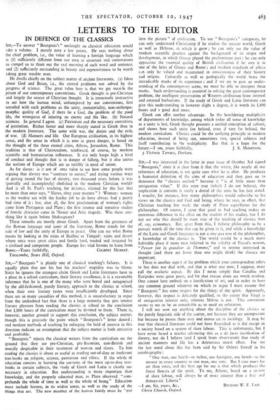LETTERS TO THE EDITOR
IN DEFENCE OF THE CLASSICS
Sne,—To answer "Bourgeois's" onslaught on classical education would take a volume. I merely note a few points. He says nothing about the chief problem, i.e., the value of learning a foreign language which is (1) sufficiently different from our own in structure and connotations to compel us to think out the real meaning of each word and sentence, and (2) sufficiently outstanding in beauty and expressiveness to be worth taking great trouble over.
He dwells chiefly on the subject matter of ancient literatures. (a) Ideas about God and Being, i.e., the eternal problems not solved by the progress of science. The great value here is that we get outside the prison of our contemporary conventions. Greek thought is pre-Christian and largely the source of Christian thought. It is immensely instructive to see how the human mind, unhampered by our conventions, first wrestled with such problems as the unity, immateriality, non-anthropo- morphic quality of God, if there be a God, the problem of the good life, the wrongness of injuring an enemy and the like. (b) Natural sciences. In general I agree. (c) Patriotism and the necessary correctives of patriotism. Rather better and more sharply stated in Greek than in the modern literature. The same with war, the duties and the evils of war. (d) Manners and life. Our Enropean civilisation, in its highest sense, and the sense in which it is now in grave danger, is based on the thought of the three eternal cities, Athens, Jerusalem, Rome. This tradition is that of Christendom, reinforced, of course, by modern scientific and humanitarian influences. It not only keeps high a level of conduct and thought that is in danger of falling, but it also unites the nations of Europe which are so terribly in need of union.
As for slaves: is it not of .ome value to see how some people were arguing that slavery was "contrary to nature," and trying various ways of getting round the fact of slavery, two thousand years before it was (partially and incompletely) abolished in the modern Christian world? And is all St. Paul's teaching, for inuance, vitiated by the fact that he more than once says, "Slaves, obey your masters" ? Women: women as the weaker sex with the harder job to do have always had a pretty bad time of it ; but, after all, the first proclamation of woman's rights came from Protagora:s and Plato ; the first intense and sensitive studies of female character came in Homer and Attic tragedy. Was there any- thing like it again before Shakespeare?
These remarks are mostly about Greek. Apart from the greatness of the Roman language and some of the literature, Rome stands for the rule of law and the unity of Europe in peace. One can see what Rome means by looking at the ruins of Baalbec or Timgad: ruins and desert where once were great cities and fertile land, tended and irrigated by a civilised and competent people. Europe has vital lessons to learn from


































 Previous page
Previous page